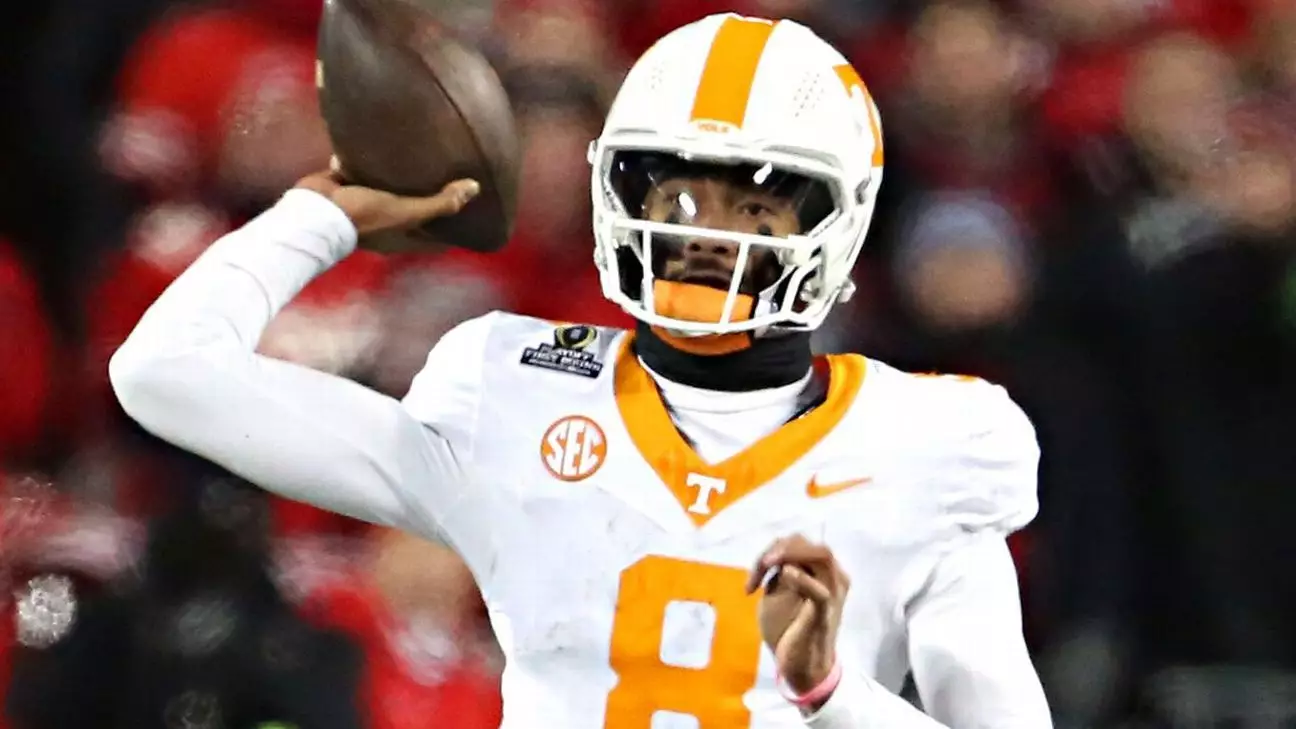In the whirlwind world of college football, recruitment is akin to a high-stakes game of chess, where every decision can radically transform a team’s future. The recent reports of Nico Iamaleava, the prodigious quarterback from Tennessee, potentially transferring to UCLA underscore a pivotal moment for the Bruins and their coaching staff under DeShaun Foster. As more than just a mere transfer, Iamaleava’s decision could indicate a decisive shift in the balance of power, not only for UCLA but for the entire Pac-12 landscape.
UCLA’s recent season, marked by a disappointing 5-7 record, has raised questions about their viability in college football’s top tier. Yet, the possible acquisition of Iamaleava signifies more than an attempt to rectify past errors; it embodies a strategic vision for the future. The Bruin’s coaching staff appears to be laying the groundwork for a team that strives for excellence, a sentiment fueled by the heightened expectations that come with such a high-profile recruit.
The Price of Power
While the details surrounding Iamaleava’s transfer remain murky, the financial implications are becoming increasingly clear. Sources suggest that the young quarterback sought a staggering $4 million from Tennessee—far removed from what UCLA has reportedly offered. This begs the question: what is the true cost of capturing talent in modern college football? Power dynamics cannot be ignored; the ability to attract elite talent is not purely a matter of skill but deeply intertwined with the financial resources and strategic partnerships teams are willing to invest.
For Iamaleava, who signed a lucrative deal worth $2.4 million at Tennessee with the Spyre Sports Group back when he was still in high school, financial considerations are understandably at the forefront of his decision-making process. The speculation that he could have netted close to $10 million if he had remained with the Volunteers for a full four years reveals the intense monetization at play within college athletics. It raises broader ethical questions about the commercialization of the sport and the pressures placed upon young athletes, particularly in the high-profile realm of college football.
The Local Hero Narrative
Iamaleava is not just any quarterback; he is a local prodigy, hailing from Long Beach, California, where expectations run high. He led his previous team, Tennessee, to the College Football Playoff, further cementing his status as a hot commodity in the sport. The lure of a homecoming, playing for a school that once courted him during his high school recruitment, is a compelling twist in this saga. Family connections also come into play; Iamaleava’s brother had a tumultuous recruitment experience with UCLA that adds a layer of personal history to this professional decision.
Football is replete with narratives, and the sense of belonging—a community, a state, a school—is profoundly resonant. This aspect of Iamaleava’s potential transfer taps into an upsurge in pride for local programs and the desire for young athletes to be homegrown champions. However, it’s crucial to recognize that such decisions are often influenced by intricate factors, including institutional relationships, financial prospects, and, perhaps most importantly, the athlete’s ambition for personal growth and national recognition.
The Road Ahead
The implications of Iamaleava’s potential arrival in Westwood could be transformative. For a UCLA program emerging from the shadow of mediocrity, his prowess gives them an immediate boost. Iamaleava’s talent positions UCLA not only to become competitive within the conference but to reassert itself on the national stage.
Yet, amidst the excitement, skepticism looms—can the Bruins maintain stability as they integrate such a high-profile player? The pressure to perform and deliver results immediately could result in a double-edged sword for Coach Foster and his team. The stakes have never been higher as the collegiate sporting landscape continues to evolve dramatically, defined by both competition and commerce.
As Iamaleava navigates through the complexities of this decision, institutions must confront the ripple effects of their choices, balancing ambition with accountability. The forthcoming chapter in Iamaleava’s career may redefine not just his future, but that of UCLA football, carving a pathway for generations of athletes to follow—a mix of promise and peril, resilience and reckoning in the world of college football.



Leave a Reply